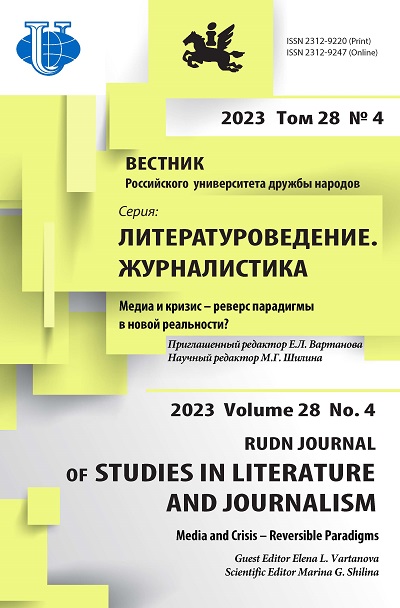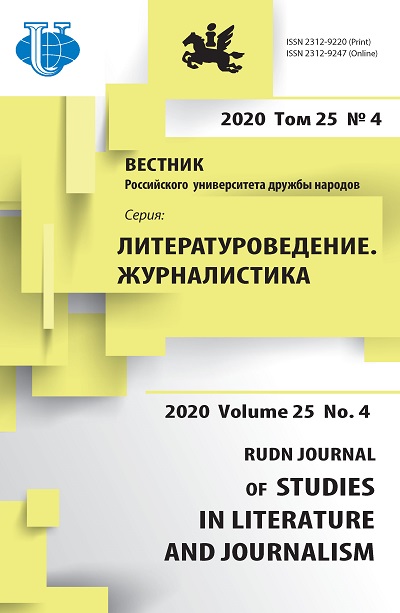Formation of international broadcasting in Russia and abroad: historical-genetic and comparative analysis
- Authors: Yefanov A.A.1, Efendieva N.E.2
-
Affiliations:
- Pushkin State Russian Language Institute
- International News Agency “Rossiya Segodnya”
- Issue: Vol 25, No 4 (2020)
- Pages: 746-755
- Section: JOURNALISM
- URL: https://journals.rudn.ru/literary-criticism/article/view/25459
- DOI: https://doi.org/10.22363/2312-9220-2020-25-4-746-755
Cite item
Full Text
Abstract
The article provides a historical-genetic and comparative analysis of foreign broadcasting. In the chronotopic aspect the advanced experience of foreign countries (Germany, England, France, USA) is compared with the peculiarities of the formation of foreign broadcasting in Russia. The main stages of the development of foreign broadcasting are highlighted. The dominant media communication channels through which foreign broadcasting activities are carried out are determined. Based on the results of the study, the conclusion is made that at the first stage of its development, foreign broadcasting was not an instrument of foreign policy and rather contributed to the cultural enrichment and support of its compatriots in other countries. However, wartime predetermined the future tonality of foreign broadcasting - a propaganda focus. During the Second World War, foreign broadcasting was used in many countries to discredit the enemy, as well as to motivate the military and the population in the rear. During the Cold War, foreign broadcasting strengthened its propaganda purpose, continuing to implement in its discourse defamatory strategies against competitors and adversaries, against the background of which a new concept of “information war” was formed. In general, foreign broadcasting as a discourse strategy is mainly used in the course of geopolitical conflicts, both open and latent. In the process of evolution of media communications, an intensification of the struggle for influence on the external audience was observed, which was most clearly manifested as a result of the implementation of foreign broadcasting in the field of television, based on the audiovisual capabilities of this type of media. In the 21st century, the information struggle for the interpretation of reality and, as a consequence, the construction of public opinion on a global scale began to take place in the field of the Internet, where foreign broadcasting has acquired a global character.
About the authors
Aleksandr A. Yefanov
Pushkin State Russian Language Institute
Author for correspondence.
Email: yefanoff_91@mail.ru
PhD in Sociology, Associate Professor of the Department of Russian Literature and Intercultural Communication
6 Akademika Volgina St, Moscow, 117485, Russian FederationNailya E. Efendieva
International News Agency “Rossiya Segodnya”
Email: nailyaefendieva@gmail.com
editor of the United International Broadcasting Directorate of the International News Agency “Rossiya Segodnya”.
4 Zubovskii Blvd, Moscow, 119021, Russian FederationReferences
- Akopova, A.L. (2019). Osobennosti razvitiya inoveshchaniya v Rossii (na primere radiokompanii “Golos Rossii” i sajta Sputnik MIA “Rossiya segodnya”) [Features of the development of foreign broadcasting in Russia (on the example of the radio company “Voice of Russia” and the website Sputnik IIA “Russia Today”)]. Vestnik Voronezhskogo gosudarstvennogo universiteta. Seriya: Filologiya. Zhurnalistika [Bulletin of the Voronezh State University. Series: Philology. Journalism], (3), 84–86. (In Russ.)
- Bystrickij, A.G., Sharikov, A.V., & Berezhnaya, V.S. (2018). Tendencii razvitiya efirnogo russkoyazychnogo radioveshchaniya za rubezhom v 2010–2018 godah [Trends in the development of on-air Russian-language radio broadcasting abroad in 2010–2018]. Mezhdunarodnaya zhizn’ [International Affairs], (11), 36–53. (In Russ.)
- Gachechiladze, I. (2006). Global’noe inoveshchanie Francii na sovremennom etape: Televizionnye kanaly v bor’be za zarubezhnuyu auditoriyu [Global foreign broadcasting in France at the present stage: Television channels in the fight for foreign audiences]. Vestnik Moskovskogo universiteta. Seriya 10: Zhurnalistika, (3), 90–97. (In Russ.)
- Dautova, R.V. (2019). Specifika inoveshchaniya na respublikanskom radio TASSR [Specificity of foreign broadcasting on the republican radio of the TASSR]. Kazanskaya nauka [Kazan science], (5), 30–32. (In Russ.)
- Ershov, Yu.M. (2010). Globalizaciya i modelirovanie nacional’nyh mediasistem [Globalization and modeling of national media systems]. Vestnik Tomskogo gosudarstvennogo universiteta. Filologiya [Bulletin of Tomsk State University. Philology], 2(10), 81–88. (In Russ.)
- Naovaf, I. (2011). “The Moscow Radio” broadcasting in countries of the Middle East during the Soviet period]. Bulletin of Peoples’ Friendship University of Russia. Series: Studies in Literature. Journalism], (1), 64–72. (In Russ.)
- Naovaf, I. (2011). Osobennosti regional’nogo podhoda v rossijskom inoveshchanii: Istoriya i sovremennost’ [Features of the regional approach in Russian foreign broadcasting: History and modernity] (Dissertation of the Candidate of Philological Sciences). Moscow. (In Russ.)
- Ivanickaya, E.I., & Dmitriev, O.A. (2017). Rossijskoe inoveshchanie segodnya: Ot mezhdunarodnoj propagandy k al’ternativnomu informacionnomu veshchaniyu [Russian foreign broadcasting today: From international propaganda to alternative information broadcasting]. MediaAl’manah [MediaAlmanach], (1), 69–79. (In Russ.)
- Ivanickaya, E.I. (2003). Sovremennoe veshchanie na zarubezhnye strany: “Golos Rossii”. 1993–2003 gg. (koncepciya, struktura, zhanrovye osobennosti) [Modern broadcasting to foreign countries: “Voice of Russia”. 1993–2003 (concept, structure, genre features)] (Dissertation of the Candidate of Philological Sciences). Moscow. (In Russ.)
- Temirov, M.S. (2012). Konvergenciya mediaplatform v amerikanskom inoveshchanii: Metodologiya i tendencii [Convergence of Media Platforms in American International Broadcasting: Methodology and Trends]. Vestnik Voronezhskogo gosudarstvennogo universiteta. Seriya: Filologiya. Zhurnalistika [Voronezh State University Bulletin. Series: Philology. Journalism], (2), 216–222. (In Russ.)
- Cherdanceva, M.V. (2018). “Myagkaya sila” inoveshchaniya [“Soft power” of foreign broadcasting]. Sovremennye nauchnye issledovaniya i razrabotki [Modern research and development], 2(5(22)), 583–587. (In Russ.)
















